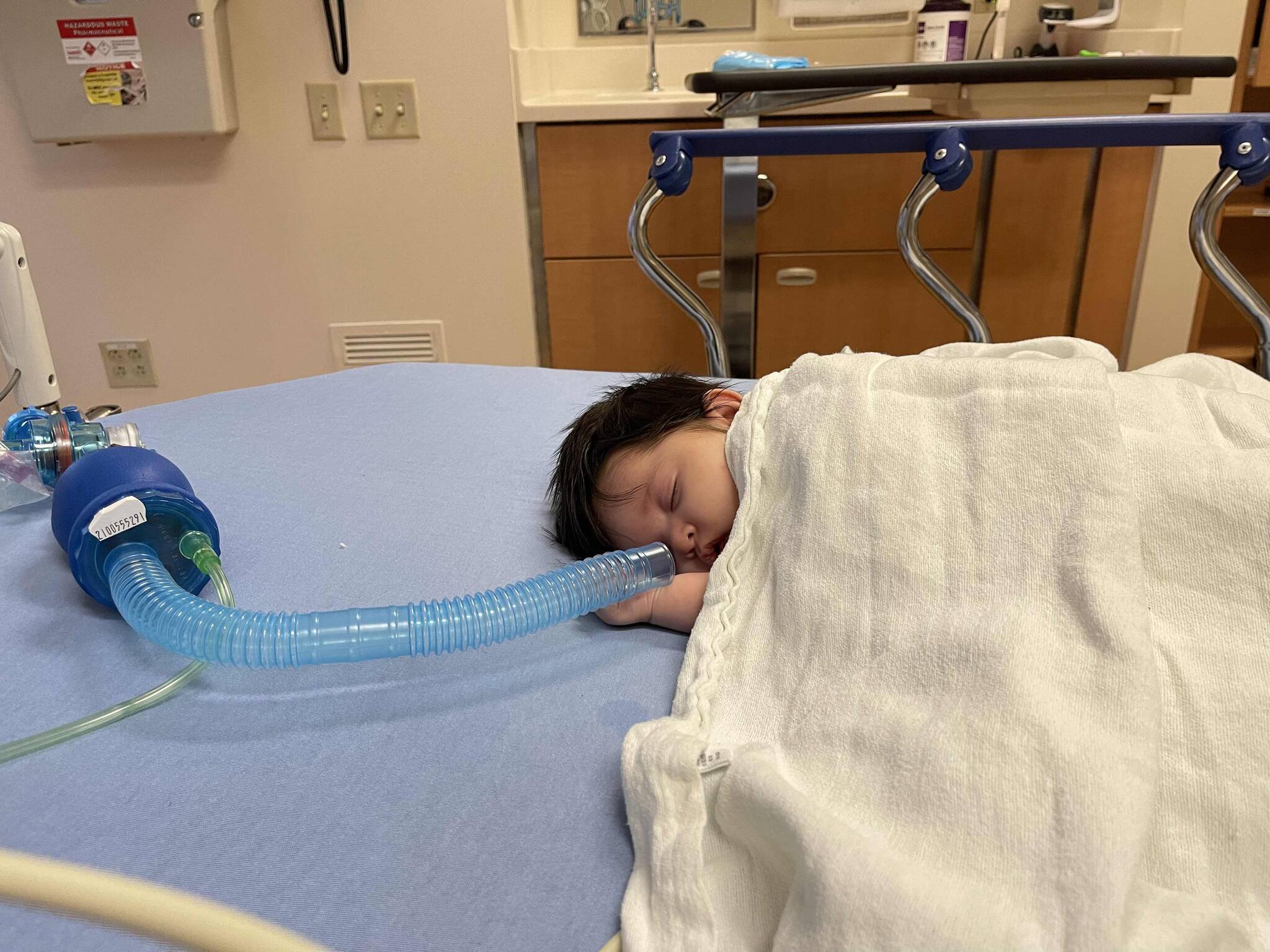At 13 weeks old, most children are learning how to lift themselves up from their stomach, hold toys, and smile to get their parents’ attention.
But Amara Muntean has another challenge to overcome — surviving leukemia.
“It’s devastating,” said Megan, her mother. “We’re brand new parents, and we don’t know what were doing… and we have a child with cancer.”
At first, Megan thought it might have been an ear infection: a slight fever, some crankiness, but nothing too serious.
But St. Elizabeth nurses quickly learned something was very wrong, and sent the Enumclaw pair packing to Mary Bridge Children’s Hospital in Tacoma.
That was Jan. 11, and Megan and Amara haven’t left the hospital since, as the girl’s chemo treatments require, at minimum, 30 days in the hospital due to her compromised immune system.
“I’m looking to live here at the hospital for the next five to seven months,” Megan said in an interview from her room, over the phone. “I’m terrified if I leave and come back — the more times you back and forth, you expose yourself to germs that this little tiny baby with no immune system, she can’t fight those things off… I have to keep her safe.”
Megan’s husband Cameron makes the drive to Tacoma every day to bring her supplies and take her clothes, which have to be specially washed every day due to Megan’s exposure to chemo.
But since she can’t leave Mary Bridge, scared even to walk outside Amara’s room for fear of bringing back any sort of contaminant, Megan and Cameron are down to only one income; when Amara received her diagnosis, her mother was just about to start a new job as a trauma therapist.
“The irony of this is not lost on me,” Megan said. “This is going to give us both Post Traumatic Stress Disorder.”
To try and make up for that lost cash, a Go Fund Me has been created for the family — close to $32,000 has been raised in less than a month. That’s more than nothing, but given the extra driving and medical costs, Megan and Cameron are going to have to stretch every dollar they have for an indefinite period of time.
“Go Fund Me is fantastic and great, but it doesn’t scratch the surface of the whole income that I used to make,” Megan said. “It’s a lot to make up for… anything that goes toward that Go Fund Me helps.”
Still, the outpouring of support for her family has been amazing, she continued — the one bright light in these otherwise dark times.
“The small town mentality of wanting to help each other is very alive and strong in Enumclaw,” she said. “There are people out there that would be going through this that don’t have this support system, and don’t have the community we do, and that would make that 10 times harder. Knowing that we have so many people out there praying for us and supporting us as we go through this has really touched our hearts.”
You can donate to the Go Fund Me at gofundme.com/f/support-for-muntean-family
ACUTE MYELOGENOUS LEUKEMIA
Acute myelogenous leukemia, AML, is a rapid-progressing cancer of the blood and bone marrow.
Diagnosis of AML are on the rare side, as they make up only 1% of cases, according to the American Society of Clinical Oncology.
Despite it being a serious disease, it is treatable and often curable with chemo, even without a bone marrow or stem cell transplant.
But leukemia patients often need regular blood transfusions to replenish their stock of healthy white blood cells, and according to a December 2022 KOMO report, Bloodworks Northwest has issued a “Code Red” emergency, meaning they saw four consecutive days of only having one day of blood supply.
Bloodworks has said it needs about 800 units of blood every day to keep up with the demand from the numerous hospitals it serves in Washington and Oregon — which means about 1,000 people have to donate their blood every day.
“Although you can’t donate to someone directly, what helps in the recovery process is a well stocked blood bank,” Megan wrote through her CaringBridge blog, which is chronicling Amara’s journey through her treatment. “If you’re able, please donate blood and/or platelets! It’s literally the gift of life, certainly for our daughter, but also for countless others.”
Though it’s normally diagnosed in older adults, the five-year survival rate is higher for people under 20 (69%), but many factors contribute to this.
According to Megan, medical experts were able to detect AML in Amara extremely early — she said her daughter’s doctor said most children that come in with AML come in, at best, with 95% of their white blood being cancerous.
Amara, however, only had 30%, and is responding well to treatment.
“They are saying that the chemo is working,” Megan said. “She’s responding in the way they would expect.”
Since the cancer is in its early stages, the situation can change rapidly.
To keep up with how Amara and her family are doing, you can read Megan’s CaringBridge blog at caringbridge.org/visit/amaramuntean


